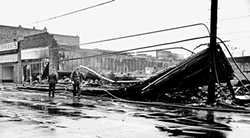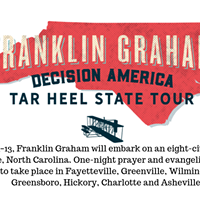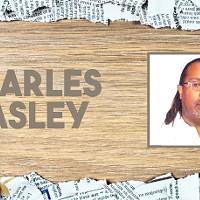Looking back on the case of the Wilmington Ten 45 years later
A future in flames
By Ryan Pitkin @pitkin_ryanIn recent years, a resurgence of black justice movements has brought the continuing struggle for civil rights back into the spotlight, with activists taking to the streets to protest injustices in Ferguson, Missouri; Baltimore, Chicago and Charlotte alike.
Throughout Black History Month this year, both Beyonce and PBS have recalled the rise of the Black Panther Party for Self Defense that took place in the late '60s and into the '70s, spurring a new wave of interest in black power movements.
Underscored by this recent focus on black power movements, the January 2016 release of The Wilmington Ten: Violence, Injustice, and the Rise of Black Politics in the 1970s by University of North Carolina-Chapel Hill professor Dr. Kenneth Janken sheds light on an oft-overlooked but crucial part of North Carolina's civil rights history.
The case of the Wilmington Ten, who were framed for crimes connected to the unrest that followed a school boycott by high school students in Wilmington in February 1971, has been overshadowed over time by civil rights flashpoints like the Greensboro sit-ins of 1960 and the Selma to Montgomery march of 1965. It remains, however, a blemish on the face of North Carolina's history and a frightful example of how the government's fear of equality-driven movements can ruin lives.
The diverse group of leftist organizations that came together in fighting to free the Wilmington Ten following their convictions also remains an example of how a fusionist movement can be successful in confronting corruption and systemic racism. The book is important in telling a story that still relates to the present time, said Janken, who also serves as director of the UNC Center for the Study of the American South.
"What occurs today in North Carolina courts — the people who are convicted on false science or who have been released on DNA findings after maintaining their innocence over the years and never believed — people should know that, one, there's a long history of that here and, two, that these are not aberrations," he said. "I think this book helps people to understand that."
The case of the Wilmington Ten began with school desegregation. The local government's first decided to close down the all-black Williston High School and integrate those students into New Hanover and John T. Hoggard high schools, instead of mixing students from all three.
At their new schools, Williston students were met with racism and outright aggression. Black students were excluded from participating in extracurricular activities such as student government, athletic teams and cheerleading squads. They also dealt with a more direct threat to their safety, as school officials allowed "out-of-school whites" – adult thugs with no business there – to congregate on campus with the sole purpose of harassing or assaulting black students on their way to class.
Most of these men were associated with a group called the Rights of White People (ROWP), an offshoot of the Ku Klux Klan that believed the Klan was "too moderate." Even before desegregation, ROWP tactics included driving into black neighborhoods in heavily armed convoys for no reason other than to intimidate residents there.
The mistreatment of black students at the two local high schools led to protests and then a boycott. This roused the ROWP, who became more violent, carrying out drive-by shootings on the church where boycotters met on a daily basis.
Roderick Kirby, who soon thereafter took the name Kojo Nantambu, was boycott leaders. Speaking recently over the phone, Nantambu recalled the boycotts as a "very tumultuous time and a very dangerous time." The book recalls how he and other students hoarded old, taped-up guns they took from their fathers in the church after the police refused to try to stop the assailants carrying out regular drive-by shootings.
"It's like sitting in your own house and someone comes to shoot at your house, you have the right to shoot back and you have the right to fight back to defend yourself. But when you fight back you are seen as the villain," he said. "This is what white folks have done throughout our history. Black folks have always been struggling to defend themselves; struggling to establish themselves as part of this country."
In the first week of February 1971, three local businesses were burnt to the ground (a recently declassified FBI report concluded that at least one was burnt by its white owners to collect on insurance money). On February 7, following the killing of unarmed protesters Steve Mitchell and multiple drive-by shootings at the church, white supremacist Harvey Cumber was shot and killed by men guarding the church after he crossed police lines and approached the church with a gun.
Cumber's death brought out the National Guard, and the boycotts were soon suppressed. Over the next year, the ROWP and other hate groups continued to maneuver with impunity while organizers continued their fight for equal treatment in a hostile environment. Then, in March 1972, the authorities made their move, arresting 17 people in connection with the protests.
The Wilmington Ten consisted of 10 of these arrests — 9 black men in their teens and early 20s and a white woman in her 30s — who were tried for the burning of Mike's Grocery on February 6, 1971, and conspiring to shoot at first responders on the scene.
The ensuing trial was a sham in every sense of the word, with prosecutors practicing illegal racial discrimination during jury selection, producing a false star witness by coaching him on a narrative that he later recanted and judge Robert Martin, State Attorney General Robert Morgan, the FBI and the ATF taking a number of other shady actions to ensure the Wilmington Ten were found guilty and the conviction was upheld during the appeals that followed.
Charlotte attorney James Ferguson battled continuously for the Wilmington Ten during the trial and for years following. Perhaps more importantly, a coalition of organizations hell-bent on raising awareness of the injustice suffered by the Wilmington Ten and protesting for their release kept pressure on state and federal authorities. The case would become a stain on Jim Hunt's tenure as governor and a glaring hypocrisy for President Jimmy Carter's administration, which took a hardliner stance on human rights abroad.
In December 1980, a federal appellate court overturned the convictions of the Wilmington Ten, but by then most of the sentences had been served. In 2012, prosecutor Jay Stroud's notes from the September 1972 Wilmington Ten trial resurfaced, confirming not only the illegal exclusion of blacks from the jury but a preference for choosing jury members with connections to the KKK. Governor Bev Perdue issued pardons of innocence to all of the Wilmington Ten. The damage, however, had been done.
"When they got out, many of their lives were ruined," Janken said. "All of their lives were in shambles, but many of their lives, the chances for what they wanted to do were gone."
The Wilmington Ten case garnered attention on an international level, but many of the case's main players held strong ties to Charlotte.
Ben Chavis, a student boycotter who became public enemy number one in the eyes of authorities and was handed the longest sentence of the Ten, was a UNC Charlotte graduate. Ferguson remains a partner with the Ferguson Chambers & Sumter firm in Charlotte and is one of the most acclaimed civil rights lawyers in the state, if not the country. The North Carolina Committee to Free Political Prisoners (NCCFPP) was a Charlotte-based organization of mostly white radical leftists that played a large role in pressuring the government to overturn the Wilmington Ten convictions. Rev. Kojo Nantambu later became the president of the Charlotte branch of the NAACP.
The case and protests that continued for nearly a decade also had a lasting impression on those who would play a major role in Charlotte's legal system for years to come.
Shirley Fulton, who later became one of the most recognizable figures in Mecklenburg County's judicial system, serving for 20 years before retiring as a senior resident superior court judge, was just a high school student and undergrad student at North Carolina A&T State University while the Wilmington Ten were going through the appeals process.
"I was very young and not very aware of the things going on around me, but I did know that things were not as they should be," Fulton said, adding that she later learned the importance of the case as she pursued her law degree and looked back on the case throughout her career.
"Folks didn't always get treated fairly in the system and I think there's been a greater effort as a result of that case to change the way that we do things to make sure that there is fair representation on the bench," she said. "I think it changed the course of history."
At a recent event at Johnson C. Smith University, Janken addressed a small crowd with his thoughts about why he wrote the book and what he hopes it will accomplish before leading a discussion with those in attendance. In the crowd were friends of the Wilmington Ten and parts of the movement that helped clear their names.
Kathy Sparrow, an active member of the NCCFPP during the case, also worked to free the Charlotte Three, three black men arrested in 1971 for the 1968 burning of Lazy B Stables in Charlotte. Those arrests were also believed to be political in nature, as all three men were known activists. She recalled how targeting leaders of North Carolina's protest movement like Ben Chavis with false accusations was an ultimately successful strategy from state and federal authorities looking to distract activists from the work at hand.
"There was so much energy in '68, '69 and 1970. I was one of those people who were naïve enough to think things would really change," Sparrow said. "Looking back now, the charges brought against the Wilmington Ten and the Charlotte Three sucked up a lot of that energy. I'm not saying that's why the movement died but that was a big part of the process of ending the movement."
Chavis currently lives in his hometown of Oxford, North Carolina, and heads up the National Newspaper Publishers Association. He couldn't be reached for this story, but in attendance at the recent JCSU event was his friend Frank Coley, who attended UNC Charlotte with Chavis in 1966. Coley said he wasn't surprised to hear Chavis's name involved with a group that was fighting for their rights, but he was bothered to hear people claiming that Chavis and his fellow organizers were anti-white racists, an allegation that's still thrown around today in regards to movements ranging from the Black Panther Party to Black Lives Matter.
Coley, a veteran of the Vietnam War and the CMPD, said he knew better. Coley rode to school with Chavis every day for a year and experienced racism at the hands of police who had problems with Coley and Chavis attending integrated parties on the UNC Charlotte campus. He said he witnessed Chavis work to de-escalate tense situations.
"Ben wasn't bitter, he just thought that it wasn't fair. And he thought that maybe he could make some difference," Coley said. "He was very concerned."
After spending many years as a leader of Charlotte's activist community and helping found the Moral Monday movement -- a movement Janken compares favorably to the one that came together to help clear the names of the Wilmington Ten -- Nantambu moved "back home" to Wilmington in November 2015.
Speaking from there, he said he has returned to find an active community of people who still keep the Wilmington Ten case fresh in their minds. While many older adults in the black community at the time refused to support the teens in their protests against an unjust school system and other oppressive governmental organizations, young people who were most active then have grown up to be parents and grandparents and have taught the next generation the message that the coalition that worked to free the Wilmington Ten fought for, he said.
"There are more people engaged and more people aware and more people inspired to do something now than there was back then," Nantambu said. "They're up and fighting because they know what happened to their brothers and mothers and uncles and grandfathers. We will never let that happen again. That is the thought process and the mindset of everyone in Wilmington right now. They know the Wilmington Ten. They know what happened. They understand the degree and the magnitude of the injustice, and the egregiousness of it. The mindset of the people here now is that this will never happen again."
Speaking of...
Latest in News Feature
More by Ryan Pitkin
-
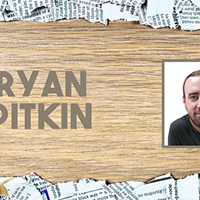
You're the Best... of Charlotte
Oct 27, 2018 -
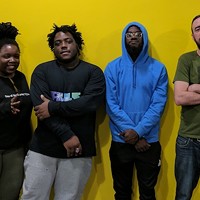
Listen Up: Cuzo Key and FLLS Go 'Universal' on 'Local Vibes'
Oct 25, 2018 -
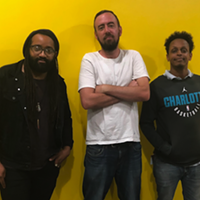
Listen Up: KANG is Back and Bla/Alt on 'Local Vibes'
Oct 18, 2018 - More »
Calendar
-

Queen Charlotte Fair @ Route 29 Pavilion
-

NEW WINDOW GALLERY-Pat Rhea-ACRYLIC PAINTINGS-April 05-30 2024 VALDESE, NC 28690 @ New Window Gallery/Play It Again Records
- Through April 30, 12 p.m.
-

TheDiscountCodes
-

"Blood Residue Analysis of Paleoamerican Stone Tools in the Carolinas" @ Native American Studies Center
- Fri., April 26, 12-1 p.m.
-

Brightfire Music and Arts Festival @ GreenLife Family Farms
-
A beginners guide to online sports betting in the US
-
5 Online Player Communities to Join in Michigan
-
Charlotte Pride and Trans and Queer People of Color Collective clash on Pride Week priorities 2
Disagreements over representation, policing in lead-up to Pride

